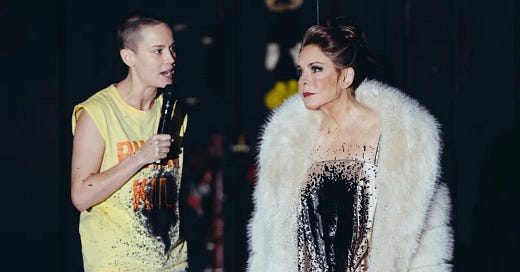Elektra (which opened last week at the Duke of York Theatre) has been much-panned, but Daniel Fish's highly experimental production is nothing less than a transformative prayer.
Brie Larson, shaven headed and in a riot grrll t-shirt, stomps the stage speaking of her intense pain and grief. Her performance is at first sight odd, punctuated by sung "Nos" and spitting, but is never less than terrifyingly alive and real. This is not acting, it is being, and ferocious in its intensity.
Larson's Elektra is surrounded at all times by six gold-glad chorus members, who revolve her, round and round like the endless cycle of life and death, exhorting her to choose a path of peace, but joining her in their saliva-flecked disgust at Aegisthus (a bizarrely underused Greg Hicks).
Stockard Channing brings a incongruous but needed note of naturalism. Not realism, because the whole play is realistic to the emotional experience of grief, but Channing's brief scene: coming to the fore to lecture her daughter, explain the impact her daughter's murder had on her, and offer up prayers, is a profoundly naturalistic one which almost seems to be from a different play, but maybe that's the point? Clytemnestra is living in a different world to her grief struck children. Marième Diouf's Chrysothemis strikes the play's only bum note, being too naturalistic to fit in with the style of the play, but not raw or truthful enough to make much of an impact. It's a thankless role, performed competently but not much more than that.
Elsewhere, modern notes don't quite work. The barrage balloon is fine, the use of audio description of tortured bodies found in the aftermath of an unknown genocide doesn't quite work. Is this intended to inspire sympathy?
It's extraordinary to see something so unashamedly avant garde and experimental on a West End stage and kudos to Larson, Fish and the production company for being willing to take this risk. This isn't a play as contemporary Western theatre-goers know it, but it is something deeper and more primal and maybe more important. It's a prayer. It's an evocation. It's perhaps like bearing witness to a dark Pagan spell or ritual being performed. I can understand why some critics hated it but the weirdness and darkness of it felt more authentic to the actual feeling of what grief feels like than any prettily dramaturged new play about death. The old ways have power we can't understand, we can only continually interpret them, millennia after millennia, stuck as we all are in the cycle of life and death, loss and understanding.
5 stars.



